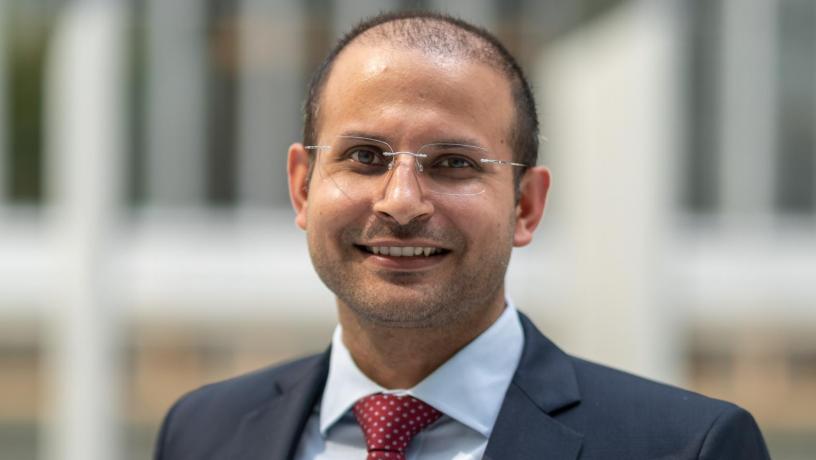Alumni Spotlight: Priyank Lathwal MS’17
Master’s alumnus Priyank Lathwal '17 SEAS shares key takeaways from his time at Columbia and pieces of advice for current students.
As a prospective master’s student, Priyank was drawn to Columbia by its diversity and by the rigor of its joint Columbia Engineering and Columbia Business School program in management science and engineering (MS&E). Today, he applies the lenses of business, research, and policy he acquired at Columbia to work on clean energy innovation, decarbonization, and climate change.
Share Your Story
Columbia Engineering is proud to recognize its alumni and their accomplishments. Alumni Spotlights showcase Engineering alums whose work and contributions to their communities embody the School's vision of Engineering for Humanity.
If you would like to be featured in a future Alumni Spotlight, let us know! Email us at [email protected].
Engineering Profiles
For more profiles of Engineering alumni, faculty, and staff, click here.

A polymath approach to a policymaking career
Prior to attending Columbia, Priyank came from an undergraduate education with a very engineering-intensive curriculum. Naturally, Priyank leveraged the opportunities and resources available at Columbia to supplement his learning in and outside of school with other coursework and experiences beyond his wheelhouse in management science.
“As I reflect on my career thus far, I have found that it’s enriching and inherently useful to be trained in a core discipline, but also to know a decent amount about a few others,” he advises.
This “polymath” approach is a trademark of Priyank’s education at Columbia Engineering. “It’s in SEAS’ DNA to be at the cutting edge,” he says, reflecting on the School’s role in transcending disciplinary boundaries since its inception.
Ultimately, this approach is also what convinced Priyank to pursue a PhD in engineering and public policy upon graduating from Columbia. “I had a job that would have allowed me to offset my student debt rather quickly,” he reflects, “or to go for a PhD and learn about empowering others, spending some time thinking about the climate issue. Looking back, it was a fantastic decision, especially from a timing perspective. These experiences taught me early on to think about the trade-offs of looking at my work as a job rather than as a profession and taking a longer-term view of things.”
Asking—and answering—the right questions
Priyank also cites his time and experiences at Columbia with training him to ask the big questions, including the ones we don’t know the answers to. While a student at Columbia, Priyank was selected for the International Fellows Program at the School of International and Public Affairs, which has brought scholars across Columbia together to analyze policy and global scholarship since the 1960s. As part of this group, Priyank wrote a final term paper on “Five Great Questions for Tomorrow,” which included, for Priyank:
- How will the United States handle the next pandemic?
- What role will the United States play in climate change mitigation?
- What is war, and what is peace in the cyber age?
- Will America be able to reinvent trade and economics for itself and the world?
- What will be the role of artificial intelligence and big data in the coming decades?
Question number one on the pandemic turned out to be more timely than Priyank could have imagined. While pursuing his PhD at Carnegie Mellon University, he received reports from family in India that the country was undergoing a debilitating second wave of COVID-19. Priyank initiated a fundraiser to “Help India Breathe,” which eventually raised $185,000 in funds to provide access to necessary COVID-19-related supplies to hospitals and care centers across the country.
This summer, Priyank was also among 44 candidates selected from nearly 10,000 applicants across 189 countries to join the World Bank Group Young Professionals Program. Within the program, Priyank intends to contribute his wealth of knowledge and experience to further tackle the energy and climate change problem. “I am joining the World Bank Group at a time when there is a war going on and inflation is at a record high. So there is a lot of work to be done. Being a Young Professional at the World Bank provides an opportunity to play a leading role in strengthening institutions globally,” he says.
Advice to current students
From his perspective as an alumnus of Columbia University, Priyank offers current students the following advice:
- Be intentional in seeking out experiences outside school and degree requirements to inform your perspectives.
- Become a better professional and invest in personal growth.
- Faculty are good resources to have, and they are available! Actively seek opportunities to engage and learn with them.
- At a place like Columbia, you will be surrounded by colleagues who are among the best and brightest in the world: Be humble and learn from them. Approach networking as a practice of building and maintaining lasting relationships.
- No matter what you choose to do later in your career, it must be in some way and form connected to the welfare of humanity.
- And finally, consider working in fighting climate change at some point in your career.
A web of support
Priyank attributes a great share of his success to the people around him at Columbia, including faculty and staff members Garud Iyengar (advisor), Geoffrey Heal (advisor), Upmanu Lall, Soulaymane Kachani, Vijay Modi, Mindi Levinson, Shivaram Rajgopal, Medini Singh, Elke Weber, Jenny Mak, and David Rothkopf.
“They were exceptionally patient and gave me the freedom and time to carve out my path,” Priyank says.
